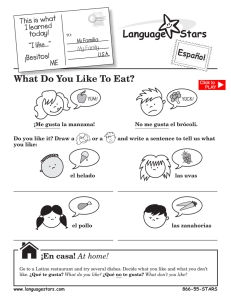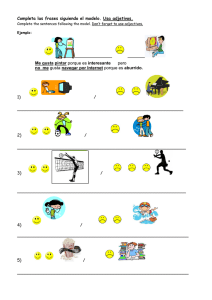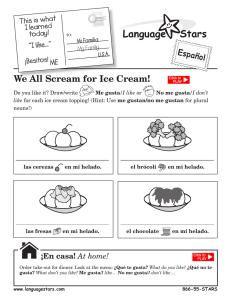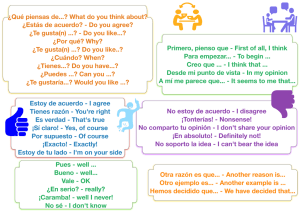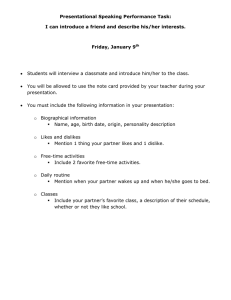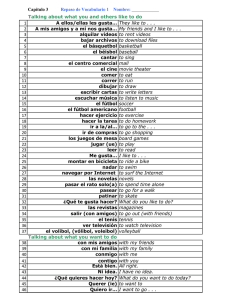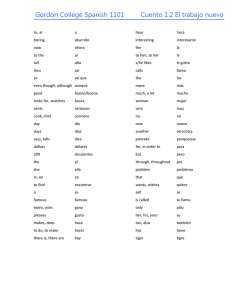Mark Scheme (Results) June 2015 - Edexcel
Anuncio
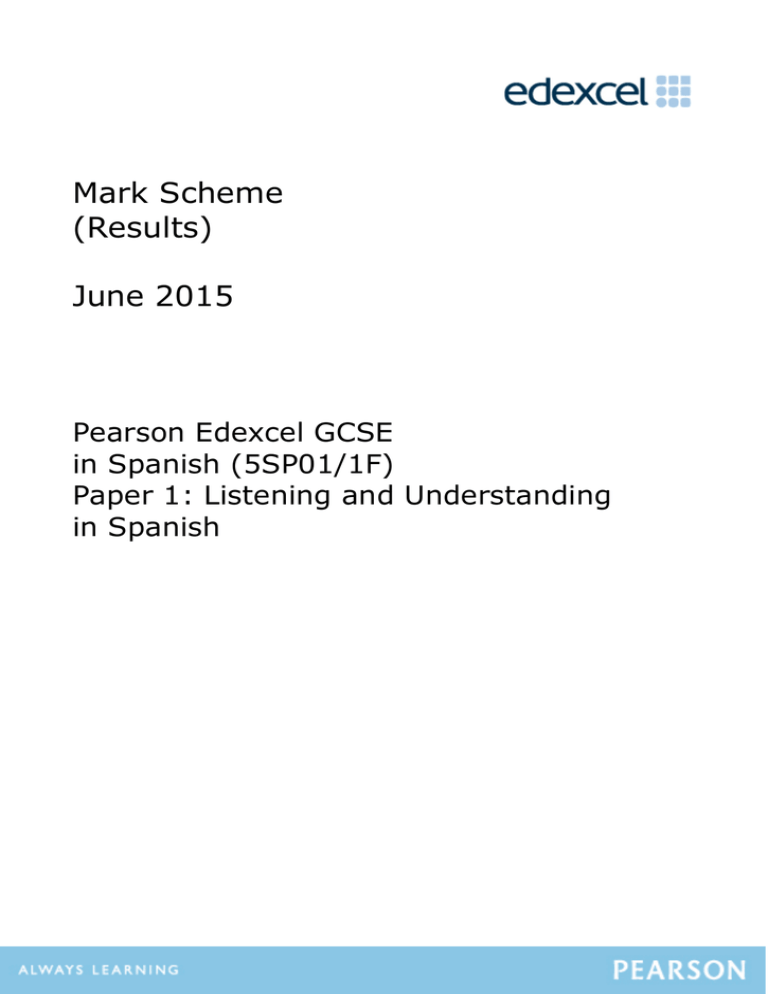
Mark Scheme (Results) June 2015 Pearson Edexcel GCSE in Spanish (5SP01/1F) Paper 1: Listening and Understanding in Spanish Edexcel and BTEC Qualifications Edexcel and BTEC qualifications are awarded by Pearson, the UK’s largest awarding body. We provide a wide range of qualifications including academic, vocational, occupational and specific programmes for employers. For further information visit our qualifications websites at www.edexcel.com or www.btec.co.uk. Alternatively, you can get in touch with us using the details on our contact us page at www.edexcel.com/contactus. Pearson: helping people progress, everywhere Pearson aspires to be the world’s leading learning company. Our aim is to help everyone progress in their lives through education. We believe in every kind of learning, for all kinds of people, wherever they are in the world. We’ve been involved in education for over 150 years, and by working across 70 countries, in 100 languages, we have built an international reputation for our commitment to high standards and raising achievement through innovation in education. Find out more about how we can help you and your students at: www.pearson.com/uk June 2015 Publications Code UG042652* All the material in this publication is copyright © Pearson Education Ltd 2015 General Marking Guidance • This mark scheme provides a list of acceptable answers for this paper. Candidates will receive credit for all correct responses but will be penalised if they give more than one answer where only one is required (e.g. putting an additional cross in a set of boxes). If a candidate produces more written answers than the required number (two instead of one, three instead of two etc), only the first answers will be accepted. Free responses are marked for the effective communication of the correct answer rather than for quality of language but it is possible that, on some occasions, the quality of English or poor presentation can impede communication and lose candidate marks. It is sometimes possible for a candidate to produce a written response that does not feature in the mark scheme but which is nevertheless correct. If this were to occur, an examiner would, of course, give full credit to that answer. • This mark scheme relates to Assessment Objective 1 – Understand spoken language. • All candidates must receive the same treatment. Examiners must mark the first candidate in exactly the same way as they mark the last. • Mark schemes should be applied positively. Candidates must be rewarded for what they have shown they can do rather than penalised for omissions. • Examiners should mark according to the mark scheme not according to their perception of where the grade boundaries may lie. • There is no ceiling on achievement. All marks on the mark scheme should be used appropriately. • All the marks on the mark scheme are designed to be awarded. Examiners should always award full marks if deserved, i.e. if the answer matches the mark scheme. Examiners should also be prepared to award zero marks if the candidate’s response is not worthy of credit according to the mark scheme. • Where some judgement is required, mark schemes will provide the principles by which marks will be awarded and exemplification may be limited. • When examiners are in doubt regarding the application of the mark scheme to a candidate’s response, the team leader must be consulted. • Crossed out work should be marked UNLESS the candidate has replaced it with an alternative response. Question Number 1(i) Answer Question Number 1(ii) Answer Question Number 1(iii) Answer Question Number 1(iv) Answer Question Number 2(i) Answer Question Number 2(ii) Answer Question Number 2(iii) Answer Question Number 2(iv) Answer Mark 1 F Mark 1 A Mark 1 D Mark 1 B Mark 1 A Mark 1 C Mark 1 B Mark 1 C Question Number 3(i) Answer Question Number 3(ii) Answer Question Number 3(iii) Answer Question Number 3(iv) Answer Mark 1 A Mark 1 A Mark 1 C B Mark 1 Question Number 4 Mark 4 Likes B & D Dislikes A & F Question Number 5(i) Answer Question Number 5(ii) Answer Question Number 5(iii) Answer Question Number 5(iv) Answer Mark 1 D Mark 1 H Mark 1 F Mark 1 E Question Number 6(i) Answer Question Number 6(ii) Answer Question Number 6(iii) Answer Question Number 6(iv) Answer Mark 1 E Mark 1 B Mark 1 A Mark 1 F Question Number 7(i) Answer Question Number 7(ii) Answer Question Number 7(iii) Answer Mark 1 Aurora Javier Javier Mark 1 Mark 1 Question Number 7(iv) Answer Mark 1 Teresa Question Number 8(i) Answer Mark Question Number 8(ii) Answer Question Number 8(iii) Answer Question Number 8(iv) Answer Question Number 9(i) Answer Question Number 9(ii) Answer Question Number 9(iii) Answer Question Number 9(iv) Answer Question Number 10 (a) Answer Reject North Spain -Spain on its own -Any incorrect part of Spain (eg. West Spain) -Any reference to a town Question Number Answer 1 B Mark 1 F Mark 1 E Mark 1 D Mark 1 E Mark 1 A Mark 1 F Mark 1 B Reject Mark 1 Mark 10 (b) Question Number 10 (c) (i) beach/ big beach (1) little beach/ near beach (ii) big or clean (1) clean town/city big town/ city Answer Lots of/ too many tourists/visitors/ people visiting (in the summer) Reject 2 Mark 1 Sport Question 1 GCSE 5SP01/1F Transcript Summer 2015 Example: F1 Juego al tenis (i) M1 Practico el esquí. (ii) F2 Juego al baloncesto. (iii) M2 Practico la natación. (iv) F1 Me gusta el atletismo. Career choices Question 2 Example: M1 Me gustaría ser mecánico. (i) F1 Quiero trabajar como azafata en el futuro. (ii) M2 Espero ser panadero dentro de cinco años. (iii) F2 Quiero ser profesora porque me gustan los niños. (iv) M1 Espero ser un pintor famoso un día. Friends Question 3 M1: ¿Cómo es Miguel? F1: Miguel es buen amigo; siempre nos da muchos regalos. M1: ¿Y Elvira? F1: Elvira ayuda a su vecina los sábados. M1: ¿Qué te parece Ramón? F1: A Ramón le gusta reír y divertirse con sus amigos. M1: ¿Y Clara? F1: Clara nunca quiere hacer las tareas en casa porque prefiere salir con su novio. M1: ¿Qué hace Jorge? F1: Jorge va al polideportivo tres veces por semana. Shopping Question 4 F2 Me encanta ir de compras y siempre encuentro cosas reducidas de buena calidad. Las dependientas que me atienden por lo general son amables y hacen un esfuerzo para satisfacer a los clientes y esto me agrada. Disfruto entrando en los grandes almacenes y nunca me canso. No me gusta nada comprar por Internet y en mi opinión ir a las tiendas el domingo es desagradable porque hay demasiada gente. Books Question 5 Example: M1 Alicia, ¿qué libros lees? F1 Me interesa la historia. (i) M1 Y tú Dolores, ¿qué piensas? F2 Me encanta preparar comidas para mi familia. (ii) M1 Paco, ¿qué dices? M2 La última moda me gusta mucho. (iii)M1 Adela, ¿piensas igual? F1 No, las novelas policíacas me interesan muchísimo. (iv) M1 ¿Qué dices Tomás? M2 A mí me gusta mucho dibujar. Using the Internet Question 6 Example: F2 Soy Lola. Me interesa ver películas. (i) F1 Mi nombre es Inés. Me gusta descargar música. (ii) M1 Me llamo Carlos. Chateo con amigos. (iii) F2 Soy Nuria. Mando correos electrónicos. (iv) M2 Me llamo José. Hago mis deberes en Internet. Local museum Question 7 F1 Mi nombre es Teresa. Nuestro museo es un edificio de estilo contemporáneo y es enorme. M1 Me llamo Javier. Me alegro de que en el museo haya tantas actividades para los niños. F1 Soy Teresa. Los fines de semana trabajo en la tienda de recuerdos del museo. M1 Soy Javier. Se aprende mucho en las visitas guiadas. F2 Soy Aurora. Me inquieta que mucha gente no venga al museo porque las entradas son muy caras. Work experience Question 8 M1 ¿Qué haces en la oficina Ana? F1 Primero hago el café. Luego tengo que repartir las cartas y por la tarde siempre utilizo el ordenador. M1 ¿Te gusta el trabajo? F1 Me gusta hablar con los clientes por teléfono pero me molesta cuando me dejan mensajes largos en el contestador porque me distraigo. Drinks Question 9 Example: M1 Tomo leche. (i) F1 Prefiero el agua mineral. (ii) M2 Me gusta el té. (iii) F2 Me encanta el café. (iv) M1 Prefiero el zumo de fruta. My Town Question 10 M2 ¿Cómo es tu pueblo, Merche? F1 Es bastante pequeño. Está en el norte de España. M2 ¿Qué hay en tu pueblo? F1 Hay una playa grande y me gusta porque es limpia. M2 ¿Hay algo que no te gusta? F1 Lo malo es que en el verano muchos turistas vienen aquí. Pearson Education Limited. Registered company number 872828 with its registered office at 80 Strand, London WC2R 0RL
